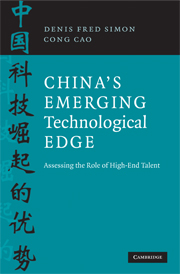Book contents
- Frontmatter
- Contents
- List of Figures and tables
- Acknowledgements
- Abbreviations
- Introduction
- 1 Human resources, technological innovation, and economic growth
- 2 China's talent challenge
- 3 Human resources in science and technology, and their structure and characteristics in China
- 4 Higher education and scientists and engineers in the pipeline
- 5 Utilization of scientists and engineers in China
- 6 “Brain drain,” “brain gain,” and “brain circulation”
- 7 Supply and demand of science and technology talent in China: key drivers
- 8 China's talent in key emerging technologies
- 9 Whither China's talent pool?
- Appendix: Understanding Chinese science and technology human resources statistics
- References
- Index
9 - Whither China's talent pool?
Published online by Cambridge University Press: 25 January 2011
- Frontmatter
- Contents
- List of Figures and tables
- Acknowledgements
- Abbreviations
- Introduction
- 1 Human resources, technological innovation, and economic growth
- 2 China's talent challenge
- 3 Human resources in science and technology, and their structure and characteristics in China
- 4 Higher education and scientists and engineers in the pipeline
- 5 Utilization of scientists and engineers in China
- 6 “Brain drain,” “brain gain,” and “brain circulation”
- 7 Supply and demand of science and technology talent in China: key drivers
- 8 China's talent in key emerging technologies
- 9 Whither China's talent pool?
- Appendix: Understanding Chinese science and technology human resources statistics
- References
- Index
Summary
This book has focused on providing a detailed stocktaking of the science and technology (S&T) talent contingent in China, accompanied by an in-depth analysis of the potential role of this evolving talent pool in Chinese current and future economic growth and technological development. As discussed in earlier chapters, during the reform and open-door era, China has gradually changed its development strategy from one heavily dependent on natural resources and capital investment to one more focussed on knowledge and talent as the key drivers of enhanced economic performance. The Chinese leadership has exhibited a pervasive sense of urgency about the need to catch up with the developed economies and has recognized that solving the country's talent issue is a crucial ingredient in terms of China's ability to cope with an increasingly competitive international environment, build a comprehensive well-off and harmonious society, and, more importantly, consolidate and fortify the ruling base of the Chinese Communist Party (CCP). It further understands that the successful creation and growth of a knowledge-driven economy requires a greatly enhanced talent pool composed of high-quality scientists, engineers, and other professionals.
In fulfilling the policies of “rejuvenating the nation with science, technology, and education” (kejiao xingguo) and “empowering the nation through talent” (rencai qiangguo), China literally has turned out millions of college students, especially in S&T, and more recently in management, to meet the new innovation challenges.
- Type
- Chapter
- Information
- China's Emerging Technological EdgeAssessing the Role of High-End Talent, pp. 333 - 346Publisher: Cambridge University PressPrint publication year: 2009



